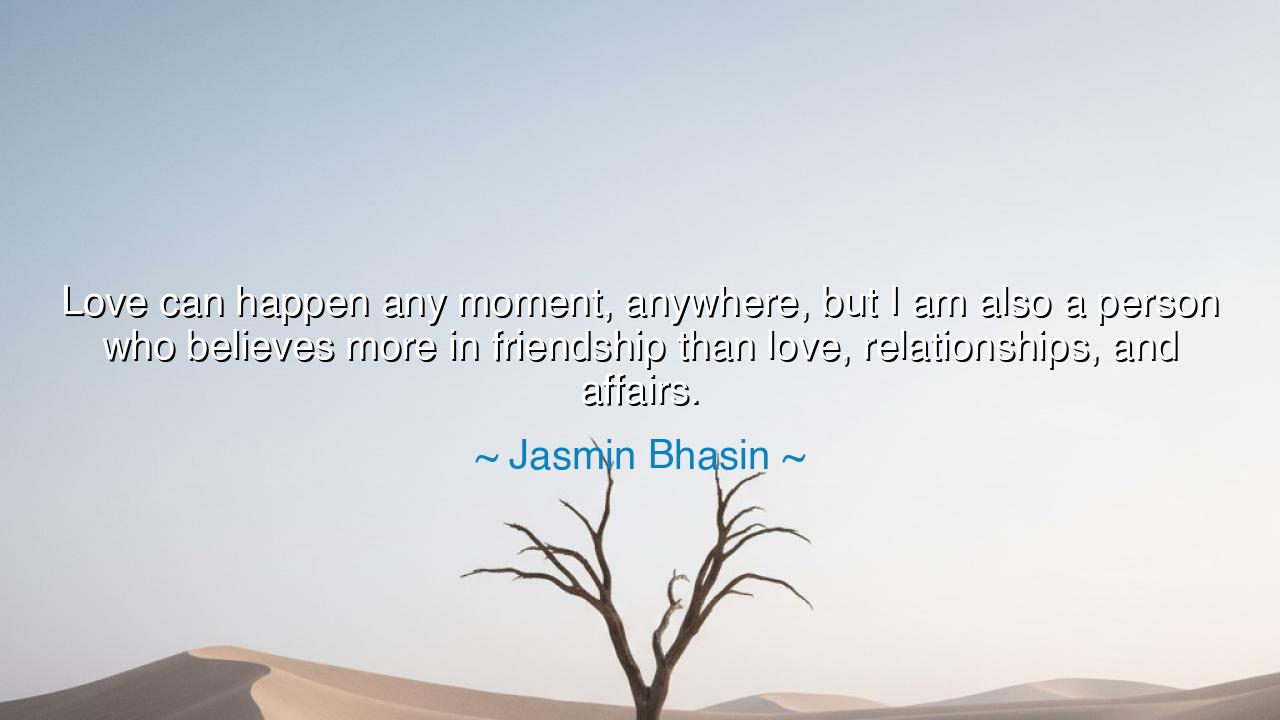
Love can happen any moment, anywhere, but I am also a person who
Love can happen any moment, anywhere, but I am also a person who believes more in friendship than love, relationships, and affairs.






"Love can happen any moment, anywhere, but I am also a person who believes more in friendship than love, relationships, and affairs." These words from Jasmin Bhasin resonate deeply with the human experience, where the pursuit of love and the quest for friendship often intersect in complex and profound ways. Bhasin speaks to the ephemeral nature of love, acknowledging that it can appear suddenly, without warning, and without any rhyme or reason. However, she also underscores the enduring value of friendship, suggesting that while love may be fleeting and unpredictable, friendship offers something far more solid and lasting. It is through friendship that we build true connections, and it is in these relationships that we often find the strength to navigate life’s challenges.
In the ancient world, friendship was considered the highest form of relationship—one that transcended the fleeting nature of romantic love and the transactional nature of political alliances. The great philosopher Aristotle, in his Nicomachean Ethics, distinguished between different kinds of relationships, placing friendship built on virtue above all. For Aristotle, a true friendship was not based on utility or pleasure, but on the shared pursuit of goodness and virtue. It was the friendship of two souls who saw in each other the potential for growth and moral excellence. This kind of bond, Aristotle believed, was the most enduring of all. In contrast, romantic love, as powerful and intense as it may be, was often seen as more transitory, subject to the whims of emotion and circumstance.
The story of David and Jonathan from the Bible is a powerful illustration of this ideal of friendship. Their bond, though unbroken by the trials and dangers they faced, was not rooted in romantic love or mutual self-interest. Instead, it was forged through loyalty, trust, and a shared commitment to each other’s well-being. Jonathan, the son of King Saul, chose to support David even when it meant risking his own future. Their friendship was not a fleeting affair but a deep connection that withstood the pressures of politics, family, and war. In their friendship, we see the enduring strength of a bond built on shared virtue and mutual respect—qualities that, according to Aristotle, make friendship the most valuable of all relationships.
Yet, the quote by Jasmin Bhasin also reminds us of the unpredictability of love. It can appear at any moment, even when we least expect it, and it can sweep us off our feet. Love, as a force, is often uncontrollable and intense, like a river that can either gently nourish the land or sweep away everything in its path. The rise of romantic love often brings joy and exhilaration, but it can also bring pain and heartache when it is not nurtured or when circumstances change. Bhasin’s acknowledgment of the fleeting nature of love contrasts with her belief in friendship, which offers a steadier, more reliable connection—one that, when based on mutual respect, honesty, and support, can withstand the test of time.
Consider the friendship of Socrates and Plato. While Socrates had many followers, his bond with Plato stands out as one of deep intellectual and emotional significance. The two were bound not by romantic feelings, but by a shared commitment to wisdom and virtue. Socrates was not just a teacher to Plato; he was a lifelong friend, someone who provided guidance and companionship through the journey of intellectual growth. This friendship was steadfast, grounded in shared values, and mutually enriching. It was not a relationship built on the transient emotions of romantic love, but on a deeper, more stable foundation—a bond of friendship that outlasted even the tragic death of Socrates.
From these examples, Bhasin's wisdom emerges clearly: love may come and go, as unpredictable and fleeting as the wind, but friendship is something that, if nurtured with care and respect, can last. Friendship offers us a refuge from the highs and lows of romantic love, providing the stability and support that we need to grow as individuals and as a community. True friendship is not contingent on the emotional intensity of a moment but is built on shared trust, loyalty, and a mutual desire for each other's well-being. It is the foundation upon which lasting relationships are built, the safe harbor in which we find shelter when life’s storms grow too fierce.
The lesson of Jasmin Bhasin’s words is clear and resonant: while love can be a powerful and transformative force, it is in friendship that we find the most enduring and reliable connections. Friendship teaches us that we do not need to rely on the whims of romantic passion to form lasting, meaningful relationships. We must invest in the friendships that nurture us, that offer us the support, trust, and respect that we need to thrive. In a world often driven by the pursuit of romantic love, let us not forget the timeless value of friendship—an enduring bond that can carry us through both the joys and sorrows of life.
In our own lives, we must strive to cultivate friendships that are grounded in mutual respect, shared values, and genuine care. Let us cherish those friendships that nourish us, that encourage us to be our best selves, and that provide a steady source of support, even when the storms of romantic love pass. In doing so, we will discover that while love may be fleeting, friendship is a treasure that lasts for a lifetime.






AAdministratorAdministrator
Welcome, honored guests. Please leave a comment, we will respond soon